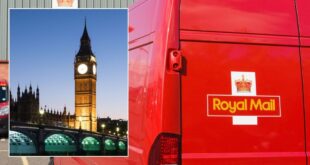These days, party manifestos come with costings. After Liz Truss’s unfunded tax cuts in the autumn of 2022, no one wants to upset the bond markets.
The Tory desire is to reduce the tax burden.
The paradox is that the baked-in-the-cake freeze on tax allowances, and the jump in the headline rate of corporation tax from 19 per cent to 25 per cent, mean that taxes as a percentage of output are still rising.
Rishi Sunak and Jeremy Hunt are persisting in an effort to eliminate employee national insurance contributions (NICs) with a further two percentage point cut.
Cutting payroll taxes is regarded as a good thing by economists because it helps make work worthwhile.
Rishi Sunak and Jeremy Hunt are persisting in an effort to eliminate employee national insurance contributions with a further two percentage point cut.
But in British political terms, it so far hasn’t had the cut-through that the much tried penny or tuppence off income taxes has.
The end of NICs for the self-employed, costing £2.6billion by 2029-30, encourages entrepreneurship.
The triple lock plus and break on stamp duty for first-time buyers speak to both ends of the generational spectrum.
Lowering national insurance ought to provide a supply side impetus by lifting growth. Harder to assess is how the Tories will pay for giveaways.
Hunt has begun the process of welfare reform by encouraging people off health benefits into work or onto cheaper schemes.
The £12billion of savings by the end of the next Parliament is more aspiration than reality.
Hunt and Sunak believe there is cash, up to £6billion by year five, to be squeezed from tax avoiders. Labour’s Rachel Reeves uses a similar figure.
This may look credible and new tech, notably AI, should help. What is missing is economic context. If, as happened in the first quarter, growth is sustained, revenues should pour into the nation’s coffers.
The need for spending reductions in unprotected services could be averted. Phew.
London calling
The listing of microcomputer maker Raspberry Pi may be modest but it demonstrates the London stock market’s appetite for innovation. The shares surged to an early premium placing a value of £770million on the firm.
This is not quite Arm Holdings which achieved a value of £41billion on the Nasdaq in September 2023 and has since advanced to £114billion on the back of AI prospects.
The potential for London initial public offerings is growing. The biggest potential launch, online fast fashion group Shein, has run into ethical waters.
Boots owner Walgreens is pushing back on a float. There are several finance groups in the queue including Starling Bank, OakNorth, Klarna and Zopa.
Big names that could come the City’s way include Unilever’s ice-cream arm, Waterstones and a revamped De Beers. There are losses too. Ashstead is looking west. Royal Mail could soon be owned by Czech sphinx Daniel Kretinsky.
A rally in UK shares could yet rescue London listings. However, the betrayal of Britain by UK pension funds and the allure of fat-cat, undisputed executive rewards are hard to resist. The City could become even less attractive if Labour penalises entrepreneurs by raising capital gains tax.
Soccer roulette
The imminent start of Euro 2024 and the Copa America has sparked a boom in fan tokens, a form of crypto.
Tokens, issued by clubs and national franchises, offer perks such as raffle entries, merchandise discounts and ticket access.
The value of tokens has climbed to £835million from £537million at the start of the year. Fans are warned that buying volatile tokens puts them at financial risk.
Not very different from the online gambling sites that suck punters in during big matches.
Source link


